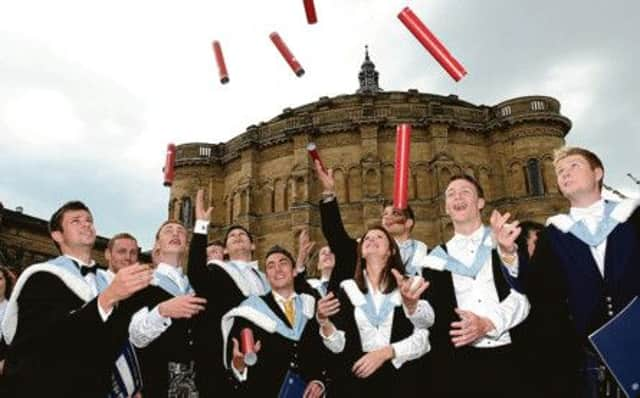Graduates fuel rise in Scots start-ups


Research from the University of Strathclyde shows that total early-stage entrepreneurial activity (TEA) in Scotland surged last year to match that of 20 peer economies for the first time. However, this has mainly been driven by high numbers of university graduates opting to work for themselves in the face of a tough job market.
Jonathan Levie – head of the university’s Hunter Centre for Entrepreneurship and author of the 12th annual Global Entrepreneurship Monitor (GEM) – said graduates tended to have limited expectations when setting up on their own, with relatively few aiming to employ more than four people within five years.
Advertisement
Hide AdAdvertisement
Hide Ad“That is where the bulk of the activity has been coming from in the last few years – graduates, but with low aspirations,” Levie said.
In addition, growth in the so-called “project economy” is also on the rise, with employee jobs giving way to freelancers.
Though the GEM survey does not break out specific numbers on freelancers, they are represented within the broader findings. Levie said he had “fears on the productivity side” of this trend.
“It is quite tough for us to get good measures, but there are certain advantages to working together in an organisation,” he said. “There are economies of scale, and you get more innovation from groups working together than from one person on their own.”
The “peak” group for entrepreneurship – those between the ages of 30 and 49 – are also increasingly setting up their own businesses in Scotland. But even with the latest rise, the Scottish creation rate for this high-activity group is less than three-quarters of that across the UK.
“It seems we may be losing peak people down to England,” Levie said. “We have been losing entrepreneurial people in the past, and that might be part of the explanation for what I call the “lost generation” of entrepreneurs”.
The gap between Scotland and the UK in TEA rates of the 30 to 49 age group has been widening since the mid-2000s, a trend that Levie said must be halted if the rising quantity of entrepreneurial activity is to be turned into quality businesses.
He is calling for a “unified approach” to entrepreneurship by business, government and academic communities to capitalise on the growing number of people starting up on their own. Such co-operation will be required to effectively address difficult barriers such as the lack of exits for investors in small firms, and the need to train up entrepreneurs in vital skills such as selling, leadership and business model development.
Advertisement
Hide AdAdvertisement
Hide Ad“There is no doubt in my mind that it is that middle group that has some business experience which are the ones who would gain the most from training,” Levie said.
The surge in new start-ups is expected to level off as and when the economy improves, with figures already revealing a slight dip in the number of people who said they intend to start a business this year.
Sir Tom Hunter, who endowed the Hunter Centre, welcomed the rise in entrepreneurial activity but echoed Levie’s call for a “Team Scotland” approach going forward.
“An entrepreneurial Scotland can’t be achieved by government, nor our educationalists nor our businessmen and women on their own,” he said. “It takes all of us together to achieve that.”